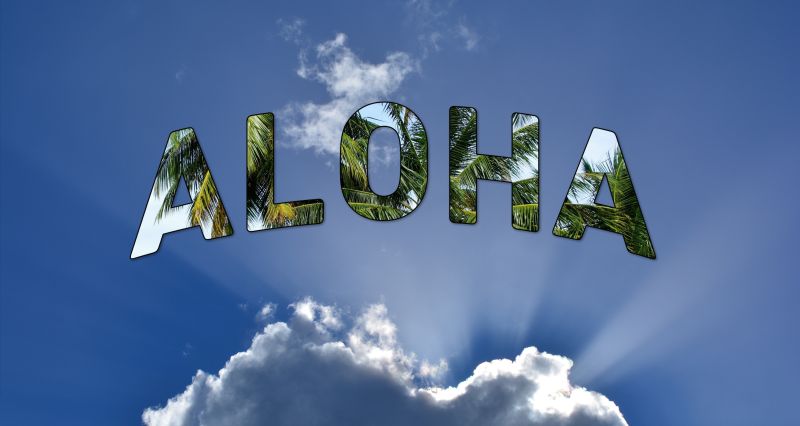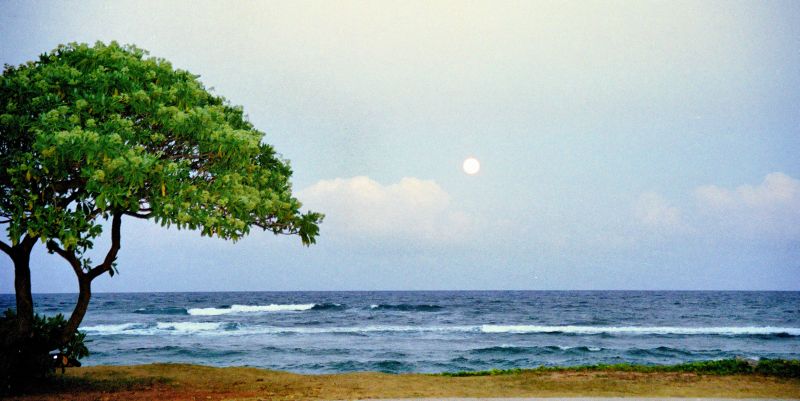
The Meaning of Aloha Through Hawaiian Language and History
Ua Kuluma Ke Kanaka I Ke Aloha.
It Is Natural For People To Behave In a Loving Way.
– Hawaiian Proverb
Aloha is one of the world’s most famous words, derived from an enchantingly beautiful language with only 13 characters. Most people on Earth have had at least a passing glimpse of Hawai’i thanks to the magic of movies, television, and music. But, in order to grasp the true meaning of the word aloha, let us try to slow down to the beat of the local rhythm and follow the roots of authentic Hawaiian culture — rather than its commercial tourist form.
Polynesians arrived at the uninhabited archipelago in the center of the Pacific Ocean over 1500 years ago, bringing their religion, language, customs, crafts, and skills with them. They lived in complete isolation from other civilizations for hundreds of years, developing knowledge and skills to survive on these isolated islands with limited resources. The land and its surroundings became an important part of Hawaiian identity and well-being. All forms of Hawaiian art and craft express this connection, this love for the land, and they do so in the welcoming and generous spirit of aloha.

Aloha is a common greeting that translates to “hello” or “goodbye.” However, excessive casual use has diluted its true significance. Aloha is more than just a greeting; it’s a concept and a way of life that serves as the foundation of Hawaiian values. Love, affection, generosity, speaking from the heart, patience, and listening are some of its many meanings. In the present, “alo” means to share. “Ha” means breath, or life energy. In addition, each letter has its own meaning.
Hawaiians do everything with aloha because they believe that love is a natural state of being. It is a positive energy exchange, and as such, it must be returned. The best way to participate in this exchange is to say the word with heartfelt intent every time. Furthermore, their concept of love is devoid of any negative emotions such as envy or fear.
Their meticulous maintenance of parks, gardens, and beaches is an example of their love. The Hawaiians are very proud of their paradise, and because they have such a strong connection to the land, the beach or park they have visited every day for many years has become as much a part of them as their own backyard. Similarly to complimenting a friend on their lawn, telling a local that they have a very beautiful beach and thank you for sharing is a wonderful form of aloha.
While traveling to other countries and continents shapes our perception of the world and provides insight into how life differs in other parts of the world, most Hawaiians have never traveled outside of the islands. Their connection to the land and the sea is a microcosm far different from the perception of the world held by more “connected” nations. Hawaiians understand that the allure of their paradise attracts visitors from all over the world, but they don’t objectify it in the way that many people who “want their own piece of paradise” do. It’s simply home and everything they’ve ever known to them! The land is linked to their entire life experience, family, and previous generations.

While it may be difficult to live among those who do not share the same attachment to their homeland, the economy of these small paradise islands is heavily reliant on tourism for survival. The people of the slow-paced islands have welcomed a large number of visitors who come and go at a different pace. The world appears to be shrinking as a result of modern communication methods and instant news updates. We are becoming more aware of our surroundings, and our society is encouraging greater empathy for our neighbors, whether they are separated by an ocean or a fence. This is undeniably a positive development, but the Hawaiian language has suffered as a result. With English as the official language (and many people regard it as the international standard), Hawaiian is rarely spoken and on the verge of extinction.
The Hawaiian language was historically an oral tradition; its alphabet was only written by missionaries in the nineteenth century, and much of Hawaiian history was passed down orally from generation to generation. While some may question the significance of this little-spoken language, it is critical to preserving Hawaiian culture. It links Hawaiians to their Polynesian forefathers and is central to their racial identity. To survive, the language must be taught and spoken! Fortunately, there has been a recent surge in interest in teaching and practicing Hawaiian. There are many words in English to express various aspects of aloha, but no English word can completely replace it.








15 thoughts on “The Meaning of Aloha Through Hawaiian Language and History”
I would like to learn more about the language, if possible learn it.
Aloha Louis:
You can look into the offerings of the University of Hawaii:
https://www.hawaii.edu/news/2020/01/10/asuh-olelo-hawaii-classes/
There are also organizations such as the ʻAha Pūnana Leo who offer online community-based options. You can look at or call about their own programs. Here is their resources page:
https://www.ahapunanaleo.org/resources-1
Thank you for writing this! It intrigues my soul. I am 69 years old and not very tech savvy. Please send me an email with the link to learn the language and the hand signals. It would be my honor to learn.
Aloha Teresa:
You can look into the offerings of the University of Hawaii:
https://www.hawaii.edu/news/2020/01/10/asuh-olelo-hawaii-classes/
There are also organizations such as the ʻAha Pūnana Leo who offer online community-based options. You can look at or call about their own programs. Here is their resources page:
https://www.ahapunanaleo.org/resources-1